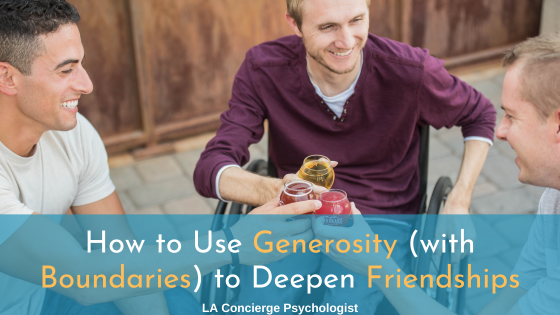The world of social media is simultaneously utopian and dystopian. Social media platforms can connect friends and families across any distance, allowing them to share in each other’s lives in previously impossible ways. On the other hand, social media has the power to isolate users, create jealousy, instill FOMO (the fear of missing out), and erode self-esteem.
Young adults seem particularly vulnerable to social media’s adverse effects on mental health. If you are the parent of an adolescent or young adult who overuses social media, you may have noticed growing problems with anxiety, depression, or low self-esteem. Your child may not realize social media is exacerbating their problems, even if they’ve read news stories about social media’s harmful effects.
Experience is the best teacher. Your child will learn more from their negative experiences on social media than they ever could from a parent’s advice. That said, it’s possible to minimize mental health consequences by teaching your child strategies for healthier social media use.
Below, we offer seven strategies that can help young adults reduce the negative impact of social media on their mental health. The next time your child expresses sadness or frustration about something on social media, consider whether any of the following strategies might help:
1. Learn to distinguish between social media versus reality
In general, people who use social media put their best face forward. They avoid sharing things that make them look bad, such as mental health struggles, academic failures, or relationship problems. Instead, they post about the most exciting, flattering things in their lives, such as vacations, achievements, and social events.
The contents of a person’s social media profile typically represent very curated elements of their life. Additionally, many photos are also edited with Photoshop or smartphone filters. When young adults realize how inaccurate social media representations are, they’ll be less likely to compare their own lives to glamourized online depictions.
Several documentaries can help your child understand the difference between social media versus reality, such as “The Social Dilemma” or “Social Animals,” both of which are available on Netflix. The indie film “LIKE” provides an even more balanced view, presenting both the pros and cons of social media (note that it is sometimes difficult to find a local showing). There are also online forums that can reveal the pervasiveness of social image editing to your child, such as Reddit’s “Instagram Reality” subreddit.
2. Keep intentions and life goals in mind
Mindless scrolling is an incredibly unhealthy and time-consuming way to use social media. If your child logs into social media without a clear intention of what they want to do, how will they accomplish anything? Or know when to stop?
Rather than using social media habitually, your child can set an intention before logging on. Perhaps their reason for being on Instagram that day is to see pictures of their friend’s new dog. Or maybe their goal is simply to kill five minutes before their next class starts. Setting an intention for each session can encourage your child to log in, accomplish something, and log back out.
We also recommend that your child consider how social media is affecting their broader life goals, relationships, hobbies, and passions. Recognizing how overuse is holding them back in certain areas may motivate them to decrease their usage. It can also inspire them to use social media as a tool for researching their passions or reinvesting in valued relationships.
Keeping their broader life goals in mind can also prevent your child from posting content that may negatively impact them in the future. Employers and potential romantic partners might Google search them at some point– is there anything online your child wouldn’t want them to see?
3. Curate the social media experience
Encourage your child to pay attention to how their experiences on social media make them feel. Sometimes they may feel connected and invigorated by social media. Other times, it might make them feel isolated and depressed. The difference often lies in the type of content they encounter.
For example, perhaps your child enjoys using Snapchat to connect with friends, but they get depressed every time they log into Instagram. If so, it might make sense for them to delete their Instagram account or limit their time there. They should also be careful about who they connect with. If seeing pictures of their ex makes them feel depressed, they should consider snoozing their posts or unfollowing them. Most social media platforms offer options to control what content your child will receive and from whom.
It’s also worth noting that your child is not obligated to say yes to every friend request they receive. If they’re not comfortable rejecting a request outright, they can simply ignore it.
4. Limit time spent on social websites
This is the simplest way to reduce the negative impact of social media on your child’s mental health. Many young adults have improved their mental health by deleting their accounts, but it’s not necessary to go that extreme. Many of our clients have experienced life-changing improvements simply by limiting the amount of time they spend on these platforms.
If your child is resistant to the idea of cutting back, suggest they try it for one week as an experiment to see how it makes them feel. Or they might try committing to one day per week (some of our clients do Tech-Free Tuesdays, for example). Most young adults who experience firsthand how cutting back on social media affects their mental health choose to continue.
Even if your child is highly motivated to decrease their social media usage, they may need help. Social media can become addictive, and research suggests a person’s self-control is finite. Should your child discover that they cannot resist the temptation, they might want to try a focus app like Freedom or Serene. At the very least, they should turn off all social media notifications on their phone.
5. Identify unmet needs
For many teens and young adults, social media fills a need that isn’t being met elsewhere. For example, a teen with low self-esteem might rely on social media “likes,” friend counts, or the number of direct messages they receive as a form of validation. A student feeling lonely might use the shallow interactions they can get online as a substitute for deeper, face-to-face relationships.
The irony of this approach is that trying to get one’s needs met on social media (versus in reality) often has the opposite effect. For example, a young adult who obsessively uses social media to fight loneliness might miss opportunities to make new friends out in the real world. They will also have fewer chances to practice the social skills needed to cultivate and maintain new friendships.
By identifying your child’s unmet needs, you can suggest healthier, reality-based ways of meeting them. This strategy is also a great way to counter social-media-induced FOMO. Instead of spending all their time watching other people do fulfilling things, your child would be better served by planning something to make their own life more exciting.
6. Practice connecting with people in the real world
Many young adults are more comfortable interacting online than in person, but face-to-face meetings get easier with practice.
If your child is socially awkward, you can encourage them to start small by initiating short, inconsequential interactions. For example, they might compliment a stranger on their t-shirt or ask a barista how their day is going. As your child becomes more comfortable, they can seek out more extended, rigorous interactions by joining a club, participating in a sport, or inviting a new friend over to study.
In-person social interactions are typically more complicated than online ones. There is much less time to come up with clever responses, and there is the added pressure of worrying about one’s appearance and body language. However, your child’s social skills can improve with self-compassion and perseverance, allowing them to experience more fulfilling interactions than they could online.
7. Take ownership of social media best practices
If your child is younger, you may have some say in how they use social media. However, there is no guarantee they won’t find a way around your rules. The older your child becomes, the more they will need to rely on their own wisdom and self-control.
You probably can’t protect your child from all possible consequences of social media use. What you can do is support them in learning healthier, more thoughtful ways of interacting online. By identifying which social media strategies work best for them, your child can take ownership of these best practices and continue using them in the future.
Support Your Teen in Better Managing Their Social Media Use
You may have noticed that your teen or emerging adult doesn’t want to listen to your advice when it comes to social media usage. Having an objective “other”, such as a teen therapist, can sometimes be helpful. Teens and emerging adults are often more receptive to suggestions from adults who are not their parents. Send us a message to see how we can help or book a free 20 minute consultation call with one of our specialists, Dr. Barajas or Dr. Goldman.



